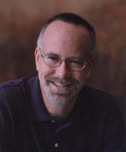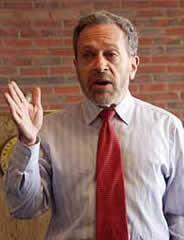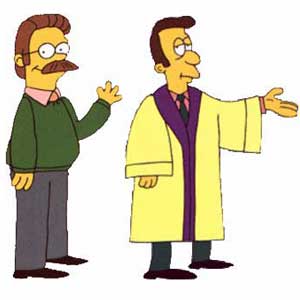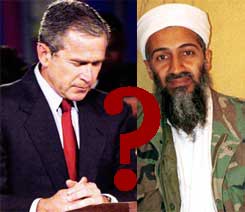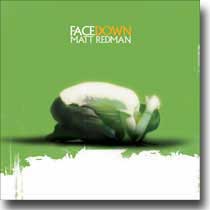| |
The Greatest Danger We Face?
by Rev. Dr. Mark D. Roberts
Copyright © 2004 by Mark D. Roberts
Note: You may download this resource at no cost, for personal use or for use in a Christian ministry, as long as you are not publishing it for sale. All I ask is that you give credit where credit is due. For all other uses, please contact me at mark@markdroberts.com. Thank you.
The Greatest Danger We Face?
Part 1 of a 3-Part Series
Posted at 9:30 p.m. on Sunday, July 11, 2004
Recently Robert B. Reich, U.S. Labor secretary during the Clinton administration, wrote a disturbing editorial in The American Prospect. (Unfortunately, you can’t read the whole article online without buying a magazine subscription. I ended up finding it the old fashioned way, buying The American Prospect magazine. I found out about the article from Presbyweb, which pointed me to a critical review by Ramesh Ponnuru, senior editor for the National Review.)
In his article, entitled "Bush's God," Reich criticizes the Bush administration for bluring what Reich understands to be the "strict separation between church and state." This is not an uncommon charge against Bush and his supporters these days. But Reich concludes his article with a stunning and surprising paragraph, which I'll cite here verbatim:
The great conflict of the 21st century will not be between the West and terrorism. Terrorism is a tactic, not a belief. The true battle will be between modern civilization and anti-modernists; between those who believe in the primacy of the individual and those who believe that human beings owe their allegiance and identity to a higher authority; between those who give priority to life in this world and those who believe that human life is mere preparation for an existence beyond life; between those who believe in science, reason, and logic and those who believe that truth is revealed through Scripture and religious dogma. Terrorism will disrupt and destroy lives. But terrorism itself is not the greatest danger we face.
|
|
| |
Former labor secretary, Robert Reich |
I had to read this several times before I really believed it. Reich makes an astounding claim, either astoundingly insightful or astoundingly wrong. As you might guess, I’ll vote for wrong. But I don’t want to leave it at that. I want to explain why Reich is wrong, not only in his conclusions, but even in the way he sees the problem. The basic categories in which Reich views the religious world are naive and simplistic, if not plainly wrong.
Error #1: Reich states: “The true battle will be between modern civilization and anti-modernists.” Stop right here. Hello? Mr. Reich, have you ever heard of post-modernism? There are a whole lot of very smart (and indeed, non-religious) people today who think that “modern civilization” is a mistaken category altogether, and that the world is a whole lot more complicated than it seemed during the Cold War, when we had one bad side and one good side. I'm not just playing word games here, but pointing out that many progressive thinkers, as well as quite a few conservative ones, believe that seeing the world in terms of modern and anti-modern categories is both overly-simplistic and distorted.
Error #2: Reich continues: “between those who believe in the primacy of the individual and those who believe that human beings owe their allegiance and identity to a higher authority.” Okay, there is a real difference here. Some believe in the “primacy” – read, primary authority – of the individual, while others believe in the “authority” – read, primary authority – of some higher being, namely God. But Reich surely realizes that this distinction isn’t actually so clear and simple in the real world. Many who reject divine authority don’t uphold the primacy of the individual at all. Instead they give primacy to the state, or to an ethnic group, or to a particular cause, or to a particular class. Even though the popularity of Marxism is waning, surely we must remember its reality. An utterly godless ideology was also utterly anti-individual, putting the priority on class and state. So, once again, Reich’s analysis is way too simplistic.
Moreover, many who believe in a higher authority reason from this belief to an extremely high view of the value of human life. Though we may not believe in the primacy of the individual, because we believe in a God who created humankind in his own image, we uphold the fundamental worth and dignity of every human life. Furthermore, many of the world’s scriptures, including the Bible, reveal the sacredness of human life, and this fact has motivated some of the greatest justice-seekers in history, including Mother Teresa, Martin Luther King, Jr., and William Wilberforce, the 19th-century British leader who almost single-handedly brought an end to slavery in the British Empire.
The errors in Reich’s thesis are so numerous that I’ll have to continue tomorrow. Stay tuned . . . .
Home
The Greatest Danger We Face? Part 2
Part 2 of a 3-Part Series
Posted at 9:30 p.m. on Monday, July 12, 2004
Yesterday I began a close reading of a paragraph by former labor secretary, Robert Reich. This paragraph concludes his recent article, “Bush’s God,” in which Reich criticizes the impact of religion on public life. In my analysis I identified two errors made by Reich, both of which show how much his perspective is overly-simplistic and therefore confused.
In case you missed it, here is Reich's concluding statement, once again:
The great conflict of the 21st century will not be between the West and terrorism. Terrorism is a tactic, not a belief. The true battle will be between modern civilization and anti-modernists; between those who believe in the primacy of the individual and those who believe that human beings owe their allegiance and identity to a higher authority; between those who give priority to life in this world and those who believe that human life is mere preparation for an existence beyond life; between those who believe in science, reason, and logic and those who believe that truth is revealed through Scripture and religious dogma. Terrorism will disrupt and destroy lives. But terrorism itself is not the greatest danger we face. [end of article]
Today I will continue with Error #3. Reich writes: “The true battle [of the 21st century] will be . . . between those who give priority to life in this world and those who believe that human life is mere preparation for an existence beyond life.” I’ve been a Christian for forty years. I’ve known thousands of Christians from all theological persuasions, not to mention many Jews, and a few Hindus, Muslims, and Buddhists. I don’t think I’ve ever talked with someone who espoused the view that “human life is mere preparation for an existence beyond life.” No religious person I’ve ever known thinks that way, not even the most hardcore Christian fundamentalist. There may be a few Islamic extremists who do think this way, and that’s why they’re willing to blow themselves up in suicide bombings. I don’t know for sure. But all I know is that Reich's caricature of religion is less realistic than the fictional religion of Ned Flanders and Rev. Lovejoy on The Simpsons. At least they act and speak somewhat like religious people I’ve actually met. |
|
| |
Perhaps Ned Flanders and Rev. Lovejoy could teach Mr. Reich a bit about what real religious people actually think.
|
Moreover, many religious people, and I’d number myself among them, believe that existence beyond this life in fact increases the meaning and value of this life. In a non-theistic world, the kind that Reich seems to prefer, human beings are really nothing more than a natural accident. To quote the classic rock line, “all we are is dust in the wind.” But if we’ve been created, not just for a few moments of worldly existence, but for eternity, an eternity in which we will share God’s own glory, then we take on infinite value. And this life, though not the end of all things, becomes extraordinarily meaningful.
Error #4: Reich sees the great conflict being “between those who believe in science, reason, and logic and those who believe that truth is revealed through Scripture and religious dogma.” Again, false distinction, utterly. When I was a student at Harvard, where Reich once taught, by the way, I knew several tenured professors of science who were strong Christians. They believed in science, reason, and logic enough to earn chairs at Harvard, which, when I last checked, doesn’t tenure professors in the sciences who reject science, reason, and logic. Yet these professors also believed that truth is revealed through Scripture and religious dogma.
In fact, these professors valued human reason and logic precisely because they believed that God created us with great mental capacity. And they were scientists because they believed that God created the universe in a way that was orderly, so that we could use our reason and logic to discover that order. Thus, far from being in tension, belief in divine revelation can go hand in hand with confidence in science, reason, and logic. One could even argue that theists have a better reason to put confidence in this scientific trinity than do those who see science, reason and logic simply as results of an accidental evolutionary process. (Reich might want to check out the website of the American Scientific Affiliation, an organization of serious scientists who also happen to be evangelical Christians.)
Error #5: Reich concludes: “Terrorism will disrupt and destroy lives. But terrorism itself is not the greatest danger we face.” Thus endeth the reading of Reich. He only implies his real conclusion, but there’s no escaping that implication from the context. Reich clearly concludes that the greatest danger we face in this century is belief in God, or at least belief that God matters for this life.
Ironically, if I were to read Reich’s last two sentences out of context, I would agree with them. With him, I do not think terrorism itself is the greatest danger we face in this world. It is only a symptom of something far deeper and more ominous. For Reich, the greatest evil is belief in God. For me, as one who thinks within the Judeo-Christian tradition, the greatest evil is human rebellion against God. Yes, that’s what we often call sin.
Doubly ironically, therefore, I believe that the greatest danger we face in our time of history is not belief in God, but the opposite: unbelief and even rebellion against God and God’s authority. So, I would argue that what Reich promotes is, in fact, the greatest danger we face. His conclusion is right. Terrorism is not the greatest danger we face. But his implication, that salvation will come through secularism, is as wrong as it could be.
But, having said this, I want to add a couple of warnings for people like me. Also I want to dig deeper into what may be behind Robert Reich’s mistaken invective against religion. Since this post in already plenty long for a daily blog, I’ll finish up stomorrow.
Home
The Greatest Danger We Face? Part 3
Part 3 of a 3-Part Series
Posted at 11:00 p.m. on Tuesday, July 13, 2004
In my last two posts I analyzed a recent statement by Robert Reich, former labor secretary during the Clinton Administration. In this statement Reich speaks of the dangers of religious faith for the world. In fact, he considers belief in a relevant God to be the single greatest danger we face today. If you don’t believe me, read Reich’s own words:
The great conflict of the 21st century will not be between the West and terrorism. Terrorism is a tactic, not a belief. The true battle will be between modern civilization and anti-modernists; between those who believe in the primacy of the individual and those who believe that human beings owe their allegiance and identity to a higher authority; between those who give priority to life in this world and those who believe that human life is mere preparation for an existence beyond life; between those who believe in science, reason, and logic and those who believe that truth is revealed through Scripture and religious dogma. Terrorism will disrupt and destroy lives. But terrorism itself is not the greatest danger we face. [end of article]
In my last two blog posts, after pointing out several egregious conceptual errors Reich makes, I concluded with my own notion of “the greatest danger we face.” It is, in fact, the viewpoint espoused by Robert Reich, which denies God’s existence or, at any rate, God’s relevance. Rebellion against God and God’s authority – which Christian theologians call sin – is precisely that which most threatens human civilization. And it is precisely what Reich appears to favor.
Having said this, however, I want to add a couple of warnings for people like me, that is, religious people and others who disagree with Reich.
Warning #1: Don’t make Reich out to be the enemy. I disagree strongly with Reich’s views, but that does not give me the right to demonize him as a person. He’s not the devil, even if I might be tempted to think of him as the devil’s advocate. In his National Review column, Ramesh Ponnuru wrote, “All of us [traditional religious folk], for Reich, are the enemy. I will not reciprocate the sentiment. Reich is not my enemy, although I certainly want most of what he stands for politically not to prevail.” We would all do well to follow Ponnuru’s example. This is especially true for Christians, who believe that in any situation, that human opponents are not our true enemy (Ephesians 6:12). Turning people into the enemy, by the way, is one of the common errors of those who reject God's relevance for the world. Precisely because I believe in God, I also believe that Robert Reich is worthy of dignity and love, even though I reject his ideas.
Warning #2: Don’t assume that all “liberals” are irreligious. Yes, Reich was a part of the Clinton administration and he continues to be a leader among Democrats. Does this mean that all liberals are irreligious? No. Yes, I am aware of recent polling data that show that “very religious” people favor Bush over Kerry 59% to 35%, and that “not religious” people choose Kerry over Bush 69% to 22%. This is a matter of deep concern for many who care about the future of our country, including deeply religious Democrats and Republicans. Even though some conservatives (and liberals like Robert Reich, ironically enough) have a hard time believing it, there are millions of faithful Christians who are Democrats because they believe that biblical priorities of justice and compassion for the poor are best worked out in a politically liberal way. (If you're unfamiliar with this mix of faith and politics, I'd encourage you to read a fascinating description by Jim Wallis, a Christian leader with liberal political leanings, of his conversation with the Democratic Platform Drafing Committee.)
Given that Reich is a very smart man, and given that he no doubt knows many liberals who believe in God, including his former boss, Bill Clinton, not to mention the current Democratic candidate for president, John Kerry, why would Reich write the things he wrote in The American Prospect? As they say, “What’s up with that?”
| I don’t know Robert Reich’s personal experience of religion, or why he might have bone to pick with all religious people. I can only work with what he has written. In "Bush's God" Reich mentions two groups of people whom he considers a threat to peaceful society: 1) Terrorists of the Islamic extremist variety; and 2) George W. Bush and his "Bushies." What do these opponents have in common? Reich must wonder. Not much, not much at all, he must realize. But they do share a belief in an authoritative God, a God who is involved in human affairs, and a God who directs people through holy texts to do certain things. Moreover, both the terrorists and the "Bushies" believe that God is in fact on their side. So, Reich concludes, the problem must be their religion. What else could it be? |
|
Actually, as I stated above, there is something else that Islamic terrorists have in common with George W. Bush, and with John Kerry, and with Presbyterian ministers like me, and even with Robert Reich himself, whether he acknowledges it or not. Sin. Sin that is our rebellion against God and God’s ways. Sin that obscures our vision, so we don’t see God and God's will correctly. One primary result of sin is that people do all sorts of terrible things, like blowing up innocent people or persecuting those who don't share their religious views, sometimes doing these things even in the name of God.
But Reich’s solution, to dispense with God and the people who believe in God, is like solving the problem of crime by getting rid of the law and the people who faithfully uphold it. Does Reich really think the world would be a better place if people weren’t religious? Does he really believe the world would be safer, more just, and more free without the likes of Desmond Tutu, Mohandas Gandhi, Martin Luther King, Jr., Mother Teresa, Vaclav Havel, and Abraham Lincoln, just to name a few? (Here’s an ironic tidbit. Vaclav Havel, former President of Czechoslovakia, was, as a liberator and leader, strongly influenced by his religious faith. In 1997 he established the Vision 97 Foundation, which awards prizes to people who have made a visionary difference in the world. Last year, the Vision 97 Foundation awarded their annual prize to guess who? Robert Reich. Too bad Reich thinks the world would be better off if people like Vaclav Havel didn't think like Vaclav Havel.)
In contradistinction to Reich, I believe that the world would be infinitely worse off without the guiding and preserving influence of religion, including religion other than my own. Yes, I acknowledge that sometimes religious people have done terrible things in the name of their religion. But I think it's clear that, in the balance, religion has done far more to ennoble humanity than to injure it. Moreover, take away religion, and you completely lose the ability to address what I take to be the world’s deepest and most pervasive problem, human sin. Get rid God's relevance to the world and before long you won’t have any world left to care about. What we desperately need today is not less of God, but rather a more faithful and truthful search for who God really is and what God really wants from us.
Home
|
